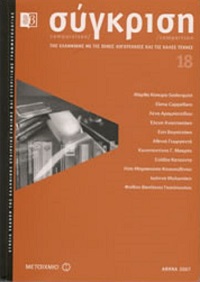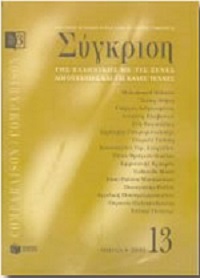Emmanuel Roidis and the Metaphor of Science
Abstract
Examining the impact of science on Emmanuel Roidis' writing, this paper tackles the issue of scientific impetus in the author's fiction, namely the short stories dealing with animals (with a focus on "The story of a horse"). It maintains that in Roidis' criticism science manifests itself by dint of Aristotelian analogy and metaphor, which is invariably employed to intersect different fields of thought, including philosophy, aesthetics, literary ideas and the scientific spirit of the nineteenth century. Informed by this propensity, the narrative in the animal stories engages in Darwinian ideas and in certain naturalist practices which parallel the social with the natural world (e.g. Zola's "circulus"), employing also motifs (e.g. human beast) which mediate Darwin's theories. Roidis' animal stories, which derive from the long-term ethical tradition of fable -from Aesop and Aristotle to La Fontaine and Koraes- open up to the scientific spirit of their era through the practice of analogical association and metaphor. In drawing a constant parallel between man and animal for satirical and ethical purposes, Rodis' text invites diverse discourses (philosophical or /and physiological treatise, social analysis, medical document and so on), creating the "mosaic" that constitutes the generic ambiguity of Roidis' short stories.
Article Details
- How to Cite
-
Βογιατζάκη Ε. (2017). Emmanuel Roidis and the Metaphor of Science. Comparison, 18, 47–71. https://doi.org/10.12681/comparison.10286
- Issue
- Vol. 18 (2007)
- Section
- Articles

This work is licensed under a Creative Commons Attribution-NonCommercial-ShareAlike 4.0 International License.
Authors who publish with this journal agree to the following terms:
- Authors retain copyright and grant the journal right of first publication with the work simultaneously licensed under a Creative Commons Attribution Non-Commercial License that allows others to share the work with an acknowledgement of the work's authorship and initial publication in this journal.
- Authors are able to enter into separate, additional contractual arrangements for the non-exclusive distribution of the journal's published version of the work (e.g. post it to an institutional repository or publish it in a book), with an acknowledgement of its initial publication in this journal.
- Authors are permitted and encouraged to post their work online (preferably in institutional repositories or on their website) prior to and during the submission process, as it can lead to productive exchanges, as well as earlier and greater citation of published work (See The Effect of Open Access).




